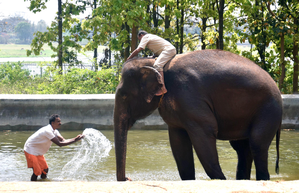Training of TN mahouts, cavadis to commence in Thailand from today
By IANS | Updated: June 17, 2025 14:23 IST2025-06-17T14:15:08+5:302025-06-17T14:23:32+5:30
Chennai, June 17 Fifteen mahouts and cavadis (assistants) from Tamil Nadu will begin a week-long training programme on ...

Training of TN mahouts, cavadis to commence in Thailand from today
Chennai, June 17 Fifteen mahouts and cavadis (assistants) from Tamil Nadu will begin a week-long training programme on scientific elephant care and management at the Thai Elephant Conservation Center (TECC) in Lampang, Thailand from Tuesday.
This international exposure is part of a broader initiative by the Tamil Nadu government to modernise elephant management practices while strengthening the welfare of both the animals and their handlers.
The team comprises staff from the Mudumalai and Anamalai Tiger Reserves, two key forest regions where captive elephants are maintained in Tamil Nadu.
They are joined by senior officials, including P. Manikanda Prabhu, Assistant Director of Vandalur Zoo; Dr. K. Rajesh Kumar, forest veterinarian from Mudumalai; and M. Megala, a forest ranger, who will oversee the training and ensure effective knowledge transfer.
The programme at TECC will cover various aspects of modern elephant management, including nutrition, healthcare, behavioural understanding, camp administration, and techniques to foster stronger bonds between handlers and elephants.
Trainers at the Thai facility are known for integrating traditional wisdom with scientific approaches to captive elephant welfare, making it a globally-recognised institution.
Supriya Sahu, Additional Chief Secretary of the Environment, Climate Change and Forests Department, highlighted that this is the second group being sent to Thailand.
“The first batch of 13 mahouts and cavadis underwent training at TECC in 2023. The objective is to promote cross-learning and bring back best practices to improve the standards of care in our elephant camps,” she said.
In Tamil Nadu, elephants are housed in forest camps located in areas such as Theppakkadu in Mudumalai and Kozhikamuthi in Anamalai.
These camps are traditionally staffed by members of tribal communities like the Malasars and Irulas, who have handed down their knowledge of elephant care through generations.
However, until now, most handlers have had little to no exposure to scientifically-guided care models practiced internationally.
“Training has largely been based on traditional experience, with no structured exposure to global standards. This initiative aims to change that,” Sahu added.
She also noted that upon return, the trained handlers are expected to share their insights with fellow mahouts across the state to ensure a wider impact. The training is expected to pave the way for a more humane and effective management system for captive elephants in Tamil Nadu.
Disclaimer: This post has been auto-published from an agency feed without any modifications to the text and has not been reviewed by an editor
Open in app